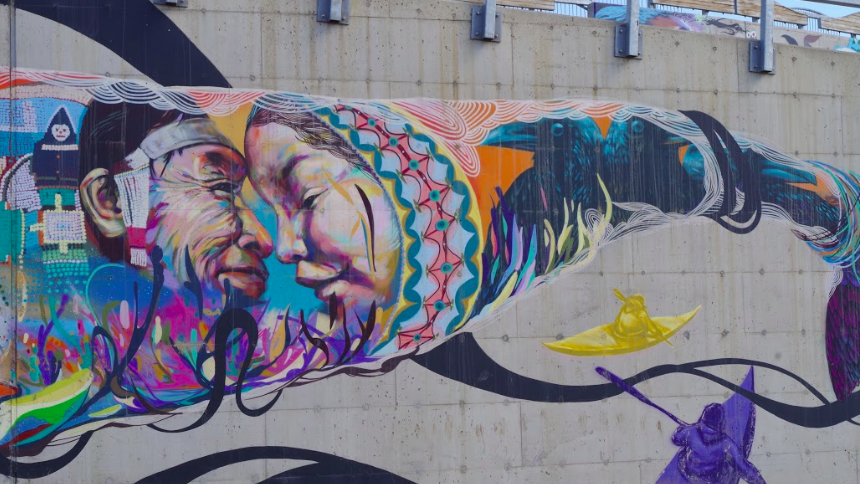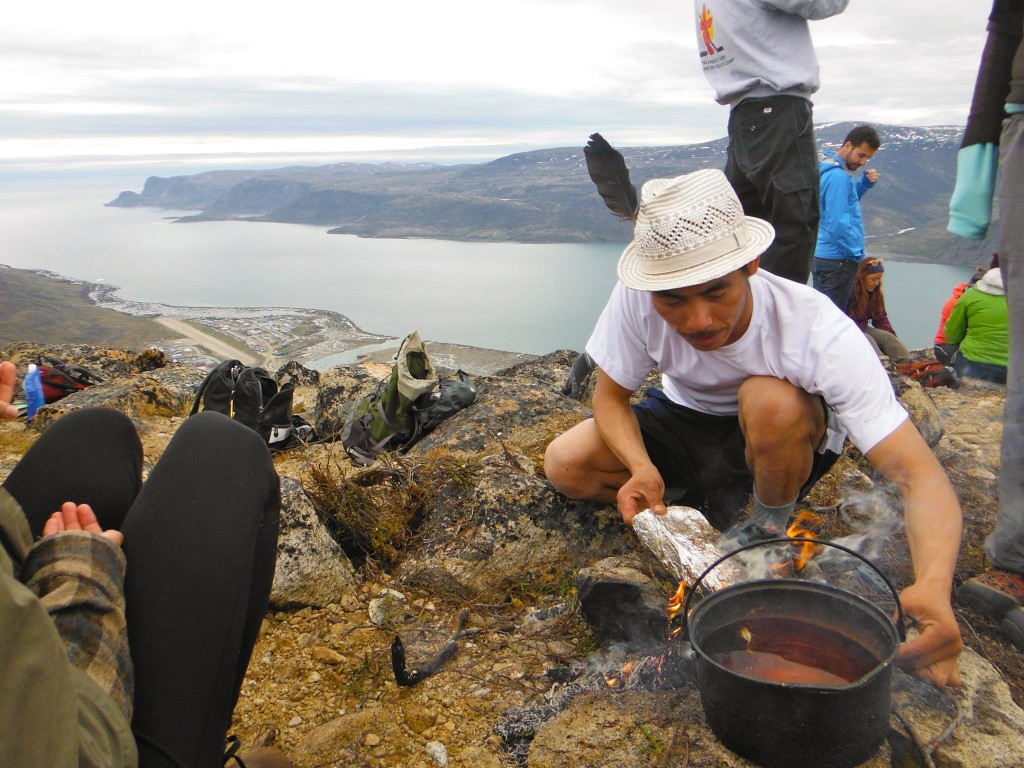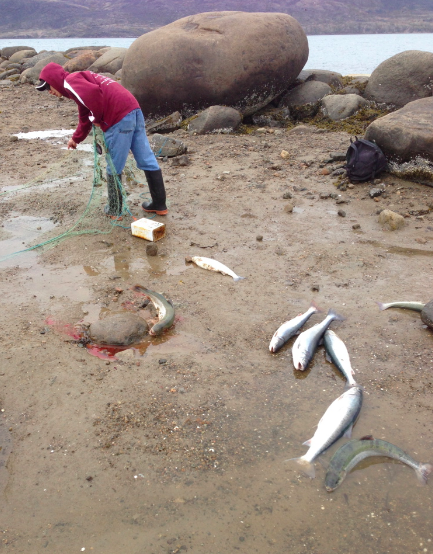Reflection of Susan Harding, a student on the program:
Peripheral intelligence
We had gathered for the first time as a class on Monday morning in late June, at St. John’s College at the University of Manitoba in Winnipeg. Peter, a professor of Native Studies and the director of the Pangnirtung Field School, would join us, the thirteen students and three TAs, later. Meanwhile, one of the TAs, Kevin, led us outside to the courtyard for some exercises. This, we would gradually find out, was the beginning of an endless train of our not knowing quite what to expect next.
Kevin, a graduate student in performance studies at UC Davis, taught us a series of “fascia exercises” designed to wake up our “embodied knowledge systems” for our impending journey to the Arctic. The dictionary says fascia is “a band or sheet of connective tissue fibers, primarily collagen, that forms beneath the skin to attach, stabilize, enclose, and separate muscles and other internal organs,” but Kevin’s definition was more elegant, elusive, and performative. Fascia form a system of “peripheral intelligence,” of unconscious ways of knowing in our bodies that have been put to sleep by our southern (aka Western) culture. The exercise would prepare — he said, “tenderize” — our southern bodies for the North, for being “out on the land” and in small boats travelling across frigid waters. We needed to attend to our bodies as thinking, knowing beings. To get to know the strange stranger within us. We were being attuned. Learning “to know” without recourse to language or conscious thought.
Without introducing ourselves to each other, we broke up in pairs and went through the exercises. We drew our hands quickly across each other’s limbs and torsos, gently twisted the other’s muscles in contrary directions, and lightly ran our fingers all over a body that by then was hard to distinguish from our own. After each exercise we were invited to wander around the yard and jot down thoughts that occurred to us. At the end of the morning — still strangers but now familiar, if awkwardly so — we gathered in a group and shared some of those thoughts. Mostly, we used Kevin’s language of having awakened our senses. I mentioned that I had become hyper-conscious of being three times older than all the other students in the program. No one spoke of the little taboos we’d broken as we dabbled in the realm between the stranger within us and the stranger beside us. A weirdly pleasing yet discomforting way to start our four-course Summer Session at University of Manitoba, the first week in Winnipeg, the last five in Pangnirtung, a small community near the Arctic Circle on Baffin Island. Officially, we were signed up for Introductory Inuktitut; Inuit Society and Culture; Cultural Continuity and Change in Cumberland Sound; and Inuit Traditional Environmental Knowledge. But we were now launched into the unofficial world of the Pang program, which invited us to undergo life in the North with our bodies as well as our minds.
—-
In stayed in Pangnirtung for the summers of 2013 and 2015. In 2015 I was a facilitator and TA for the Arctic Bush School, through the Native Studies Department at the University of Manitoba Canada. This is a five-week on the land immersion program with Inuit hunting families from Pangnirtung, Nunavut (Baffin Island, Eastern Arctic, Canada). As a TA I helped organize all of the land-based needs (food, lodging, gas, logistics) and the massive organization of bringing food for 40 people up to the Arctic. I also helped organize and set up community-based projects for each student in partnership with the Inuit community of Pangnirtung and assessed their work.
I originally went to the Arctic through a Mellon Foundation Scholarship as part of my performance practice.
My research intersects site particular decolonizing performance research, embodiment studies, ecological critique. I wanted to examine, through theoretical and practice-based research, how site particular interactive performance can be a tool for creating an embodied sense of one’s connection to the surrounding ecology in urban communities in Southern Canada while making present the colonial violence that aims to disconnect relations between Indigenous people and the land and between settler Canadians and their colonial white supramcist histories and that shape what relations can be..
I questioned how site particular participatory performances in urban watersheds can be a tool for developing a felt ecological embodiment. I will question how site based participatory performance piece create a knowing and feeling of a certain place? How do we get along performatively with systems and objects that can always surprise us? How might it be possible to know about things indirectly without the pressure of centering any one thing (especially the “human”)? This research will examine and further develop research on site based performance practice and focus on site particular research as a tool for affecting a felt sense of our enmeshed ecology.
Below is a description of the performance project:
I have been offered a place in the 6 week Pangnirtung (on Baffin Island in the Canadian Arctic) summer research program offered by the Native American studies and Faculty of the Environment through the University of Manitoba in Winnipeg. I will participate in embodying practices of the Inuit (hunting, fishing, storytelling, dance and will also teach dance classes in exchange). I will examine myself as I learn from the embodying practices of the Inuit. Pangirtung is a place where long term studies on climate change effects on the Inuit have been documented. Birds such as robins from Southern Canada have been spotted and the community has documented its first lightening and thunder storm. It is also a community where Inuit traditional knowledge, language and practices thrive even as they have been greatly impacted by colonization
From the Canadian Arctic I will travel to Southern most area of Canada where I have been commissioned to create a site particular performance along the edge of the Antler River (Thames Valley Watershed) in London Ontario. This area of Canada is marked by widespread industrial agriculture. Over fifty percent of the population was not born in the watershed.
Using video, Skype technology, images and stories I will bring together these two distinct communities through performance. I will question how site based participatory performance pieces create a knowing and feeling of a certain place? How do we get along performatively with systems and objects that can always surprise us? How might it be possible to know about things indirectly without the pressure of centering any one thing (especially the “human”)? How does performance offer a place for multiple worldings to emerge as a becoming with (without understanding)? How does site particular performance allow people to feel touched by the materiality of particular place? In being touched by a place how does it change our obligation towards it? This research will examine and further develop research on site based performance practice and focus on site particular research as a tool for affecting a felt sense of our enmeshed ecology.


